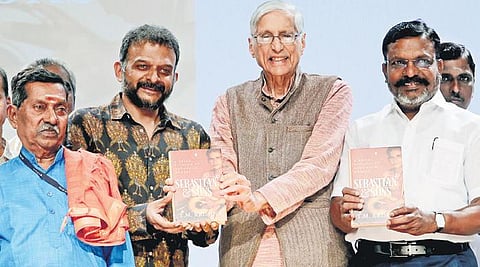

BENGALURU: Mridangam makers, along with their families from Tamil Nadu, Kerala and Karnataka, came together to attend the launch of Carnatic vocalist TM Krishna’s latest book — Sebastian and Sons: A Brief History of Mrdangam Makers recently. The evening in Chennai began with a musical performance by mridangam artistes. The book has stories of over six generations of families involved in the business, and three female mridangam makers. Krishna calls Sebastian, after whom the book is named, as the father of this profession and the other makers, his children. From acquiring the skin to the final stages of construction, it addresses every aspect of a mridangam’s making — intellectually and aesthetically.
“The quality of the hide and how it is cured, cut, stretched, bound and braided impacts the tone, timbre and sound of the instrument. This requires a highly tuned ear, and an ability to translate abstract ideas expressed by musicians into the corporeal reality of a mridangam. Yet, their contribution to the art of the mridangam is dismissed,” he said.
This was followed by a panel discussion with Rajmohan Gandhi, historian and biographer; Thol Thirumavalavan, Lok Sabha MP, and Krishna, and was moderated by journalist Kavita Muralidharan. They talked about caste discrimination, plight of the makers and underlying issues. “The one who creates the instrument is not treated equally in society or recognised. But mridangam makes it to the stage. If this is the case for mridangam makers, then think about parai. After all, the mridangam is an evolution of parai,” said Thirumavalavan.
Gandhi said it addressed the darker side of the community. “We are fighting for liberty, equal rights and mutual respect. Sadly, there’s ignorance at one end and silent indignation on the other. The book captures this essence,” he added.
This work is a culmination of Krishna’s other book, A Southern Music: Exploring the Karnatik Tradition. “I realised I had not addressed any instrument makers in it and decided to focus exclusively on them. I’m privileged and no matter how much I talk about caste, I will not lose my privilege. I don’t know if the book will bring light to their lives or recognition. I’d be glad if it raises a few questions in your mind after a read,” he concluded.